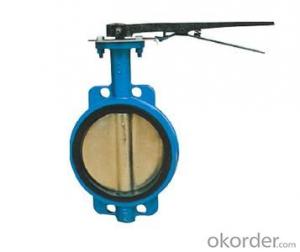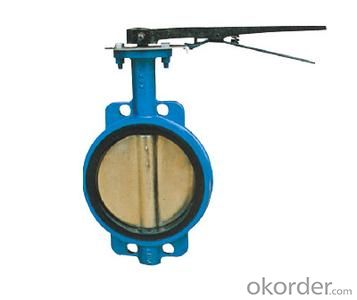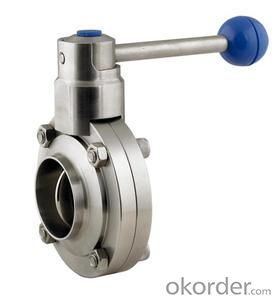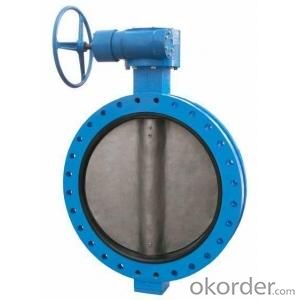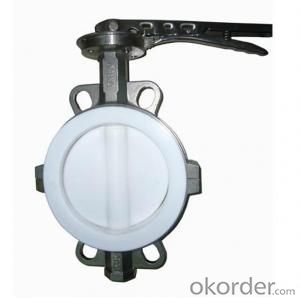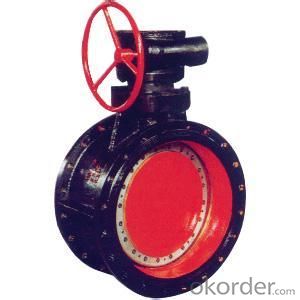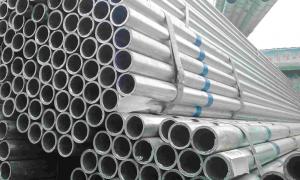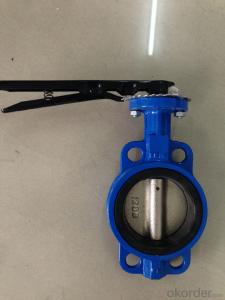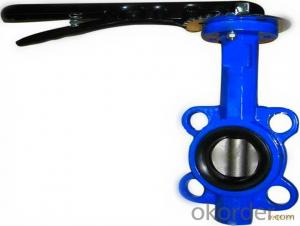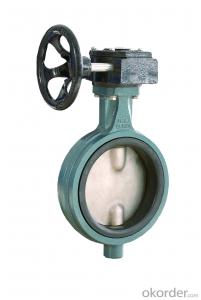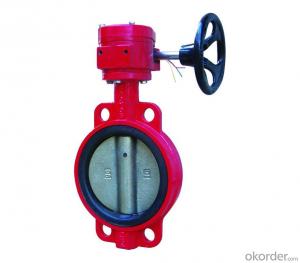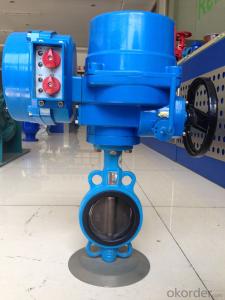ALLOY STEEL BUTTERFLY VALVE DN25-DN1200 BG290
- Loading Port:
- Shanghai
- Payment Terms:
- TT OR LC
- Min Order Qty:
- 1 pc
- Supply Capability:
- 10000 pc/month
OKorder Service Pledge
OKorder Financial Service
You Might Also Like
Specifications
Long service life, standing the test of tens thousands opening/closing operations
Butterfly Valve
Packing & Delivery:
Packing: plywood box or according to specific customer needing .
suitable for long-time sea shipment
Delivery: within 15-30days after receipt of at sight L/C or 30% as advance payment by T/T
Materials:
Body: aluminum, cast iron, ductile iron, carbon steel, stainless steel
Disc: cast iron, ductile iron, carbon steel , stainless steel
Stem: carbon steel, stainless steel
Seat: EPDM, PTFE, NBR
Specifications
Size: DN25-1200 (1”-48”)
Pressure: PN10/16( 150/200 PSI)
Actuator: handle/gear box /pneumatic /electric
Standard: API, ASTM, ANSI , DIN, BS, JIS ,ISO approved
End connection: wafer type, flange type, lug type
Features:
1.Unique stem hole design in the disc ensures a dry stem journal;
2.360 degree polished disc assures positive on-off;
3.Long service life, standing the test of tens thousands opening/closing operations;
4.Bubbles-tight sealing with no leakage under the pressure test;
5.Wide selection of materials , applicable to various medium
- Q: Are steel pipes suitable for use in coastal areas?
- Yes, steel pipes are suitable for use in coastal areas. Steel is known for its durability and resistance to corrosion, which makes it a reliable choice for withstanding the harsh conditions of coastal regions, including exposure to saltwater and high levels of humidity. Additionally, steel pipes can be coated or galvanized to provide extra protection against corrosion, ensuring their longevity and performance in coastal environments.
- Q: How are steel pipes used in the automotive exhaust systems?
- Steel pipes are commonly used in automotive exhaust systems because steel is a durable and heat-resistant material. Steel pipes are used to transport the exhaust gases from the engine to the muffler and tailpipe, ensuring that the gases are safely and efficiently expelled from the vehicle. These pipes are designed to withstand high temperatures, corrosion, and vibration, making them an essential component in the exhaust system.
- Q: How are steel pipes used in the oil and gas pipeline transportation?
- Due to their durability, strength, and resistance to corrosion, steel pipes find extensive use in the oil and gas industry for pipeline transportation. Specifically designed to withstand high pressure and transport various fluids, including crude oil, natural gas, and refined petroleum products, these pipes serve three main purposes in the industry: gathering, transmission, and distribution. Gathering pipelines collect oil and gas from production wells and transport them to processing facilities. Steel pipes are chosen for their ability to endure harsh conditions at extraction sites and effectively transport fluids across long distances. Transmission pipelines, on the other hand, transport oil and gas across vast distances, even spanning countries or continents. Steel pipes are perfect for this task, excelling in handling high pressure and ensuring the efficient flow of fluids over extended distances. To safeguard against external elements and minimize damage risks, these pipes are often buried underground or submerged in water. Distribution pipelines deliver oil and gas to end-users, such as homes, businesses, and industrial facilities. Steel pipes are frequently employed in these pipelines due to their capability to handle varying demand and pressure requirements of different consumers. Though smaller in diameter compared to transmission pipelines, they still provide reliable and safe transportation of oil and gas to their final destinations. Besides their strength and durability, steel pipes used in oil and gas pipeline transportation are coated or lined with different materials to enhance corrosion resistance and reduce the risk of leaks. These protective coatings and linings ensure the pipes' longevity and preserve the integrity of the transported fluids. In summary, steel pipes play a vital role in the oil and gas industry by providing a dependable and efficient means of transporting oil and gas from production sites to processing facilities and ultimately to end-users. Their durability, strength, and resistance to corrosion make them an ideal choice for pipeline transportation in this industry.
- Q: Are steel pipes suitable for underground sewage lines?
- Yes, steel pipes are suitable for underground sewage lines. They are strong, durable, and resistant to corrosion, making them an excellent choice for sewage systems.
- Q: What is the maximum pressure that steel pipes can withstand?
- The maximum pressure that steel pipes can withstand depends on various factors such as the grade and thickness of the steel, the diameter and length of the pipe, and the specific application. However, steel pipes are known for their high strength and durability, allowing them to withstand significant pressures ranging from several hundred to several thousand pounds per square inch (psi).
- Q: Can steel pipes be used for culvert applications?
- Yes, steel pipes can be used for culvert applications. Steel pipes are commonly used for culverts due to their durability, strength, and resistance to corrosion. They can withstand heavy loads and are able to handle high traffic volumes and large water flows. Additionally, steel pipes can be easily manufactured in various sizes and shapes to suit specific culvert requirements. Their longevity and low maintenance needs make them a cost-effective choice for culvert applications.
- Q: How do steel pipes resist corrosion?
- Steel pipes resist corrosion through a process called passivation, where a protective layer of chromium oxide forms on the surface of the steel, preventing direct contact with corrosive elements and slowing down the oxidation process. Additionally, steel pipes can be coated with protective layers such as zinc or epoxy to provide an extra barrier against corrosion.
- Q: What is the difference between steel pipes and fiberglass pipes?
- Steel pipes are made from a durable alloy of iron and carbon, while fiberglass pipes are composed of a reinforced plastic material. The main difference is that steel pipes are stronger and more resistant to high temperatures and pressure, making them suitable for heavy-duty applications such as oil and gas pipelines. On the other hand, fiberglass pipes are lighter, corrosion-resistant, and have better thermal insulation properties, making them ideal for industries like chemical processing and wastewater treatment.
- Q: Are metal spiral tubes the same as metal bellows?
- The spiral pipe is mainly used in the pipeline of petroleum and natural gas, and its specifications are indicated by outer diameter * wall thickness.
- Q: How are steel pipes used in sewage systems?
- Steel pipes are commonly used in sewage systems due to their durability and strength. They are used to transport sewage from homes, businesses, and industries to treatment plants or disposal sites. Steel pipes are able to handle the corrosive nature of sewage and are resistant to various chemicals and pressure. Additionally, they are also used for the construction of manholes, pumping stations, and other sewage system infrastructure.
Send your message to us
ALLOY STEEL BUTTERFLY VALVE DN25-DN1200 BG290
- Loading Port:
- Shanghai
- Payment Terms:
- TT OR LC
- Min Order Qty:
- 1 pc
- Supply Capability:
- 10000 pc/month
OKorder Service Pledge
OKorder Financial Service
Similar products
Hot products
Hot Searches
Related keywords
